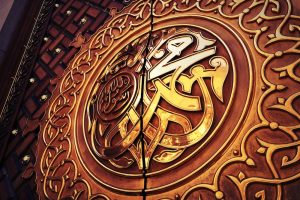
Zafir Malik, UK
Last week, if you typed in Google: ‘Who is the Caliph of Islam today?’ you would have found the answer to this question, which is: Hazrat Mirza Masroor Ahmad (aba), Fifth Caliph of the Ahmadiyya Muslim Community. There has been a lot of controversy since the search engine, as well as Wikipedia, put Hazrat Mirza Masroor Ahmad (aba) as the Caliph of Islam today. Unfortunately, this simple truth incensed non-Ahmadi Muslims and after a lot of propaganda, they had the page removed. Although they may have succeeded in removing this page, what they cannot do is answer the original question: ‘Who is the Caliph of Islam today?’
For argument’s sake, If Hazrat Mirza Masroor Ahmad (aba) is not the Caliph of Islam today, then who is? Who is that single unified leader that the entire Muslim Ummah look to as their representative? Unfortunately, these questions remain unanswered by them and will continue to do so. The reason is that the notion that the entire Muslim Ummah is ‘one’ or ‘united’ is a complete fallacy. If the entire Muslim Ummah gather together to elect one leader, with representatives of each denomination present in this meeting, they will never be able to come to an agreement, irrespective of how much time they take to deliberate over the matter. The reason for this is that each sect is at complete odds with one another. Put declaring Ahmadis as kafir [non-Muslims] to one side, each sect not only declares each other kafirs, but the malice and rancour they have for each other is plainly evident in their writings.
For example, the bitter hostility and enmity between the Barelvi and Deobandi is an issue that spans more than 100 years. In order to declare Ahmadis, Deobandis, Ahl-e-Hadith sects as Kafirs, Ahmad Raza Khan, founder of the Barelvi movement gathered Fatwahs [edicts] against them from scholars of Makkah and Madinah and published them in his book titled ‘Husam al-Harmain’ [Sword of the Two Holy Sites].
He did not stop at this; in ‘Fatawa-e-Razviyya,’ which is a compilation of the Fatwahs issued by Ahmad Raza Khan himself, he was asked by one of his followers ‘What are the various kinds of disbelievers and which out of them is the worst?’ In reply, he stated that there are various types of disbelievers, but the worst of all are ‘apostates and hypocrites’ [Murtad Munafiq]. He further says: ‘Murtad Munafiq is one who professes belief in the Islamic declaration of faith, but then are guilty of blasphemy against Allah the Almighty, the Holy Prophet (sa) or any other prophet, or rejects one of the tenants of faith, these include Wahhabis, Rafidis [Shia’s], Qadianis, Naturi [Rationalists], Chakralvi [Ahl-e-Quran].’ [1] He then goes on to single out Wahhabis and Deobandis in this category of the worst of all non-Muslims and states they are worse than a ‘deadly poison’. [2]
Let us now look at how the Deobandi’s view other Muslim sects. Rashid Ahmad Gangohi, a famous Deobandi Scholar, was once asked about some beliefs of Ahmad Raza Khan, and whether a person who holds such beliefs is to be deemed a kafir, and can one meet and stay in their company. In reply to this, Rashid Ahmad Gangohi replied that whoever held such beliefs is a kafir, meeting with such a person and befriending them is forbidden. [3]
It is a well-known fact that the beliefs of Sunnis and Shias are poles apart, to say the least. By way of example, all of the Sunni sects within Islam believe that the Holy Prophet Muhammad (sa) was succeeded by four rightly guided caliphs, namely; Hazrat Abu Bakr (ra), Hazrat Umar (ra), Hazrat Uthman (ra) and Hazrat Ali (ra). In contrast, the Shias hold the view that Prophet Muhammad (sa) was succeeded by 12 Imams, the first of whom was Hazrat Ali (ra). They believe that these 12 Imams were divinely ordained and were all the descendants of Hazrat Ali (ra) and Hazrat Fatimah (ra). According to the biggest Shia sect known as the ‘Ithna ‘Ashari (Twelver) ‘rejection and disobedience to any of the twelve Imams constitutes betrayal equal to the rejection of Muhammad’. [4] Hence the Shias reject the caliphate of the other three Rightly Guided Caliphs. So, if this Muslim leader was elected amongst the Shias, how would the Sunnis reconcile this fundamental difference?
These are just a handful of the more ‘civil’ fatwahs, otherwise, the fatwas contained in these books are extremely unforgiving. The more one reads about the beliefs of each sect, the more division becomes apparent among the Muslim Ummah. Perhaps uniting the entire Muslim Ummah is too much to ask. How about then if all the schools of thought within Ahlus Sunnah Wal Jama’at gather together and elect one single leader to represent them? The reason I single out the Ahlus Sunnah Wal Jama’at is because it is very easy to put ‘Jama’at’ [Community] alongside one’s name, but a Jama’at has one Imam, who is that from among the Ahlus Sunnah Wal Jama’at, that is accepted by every single person who attributes themselves to this sect? In comparison, ask any Ahmadi child, man or woman, living in any part of the world, who is their leader, the answer will be the same for each person everywhere; Hazrat Mirza Masroor Ahmad (aba).
No blame lies with the people at Google and Wikipedia, for they only see one unified leader of a Muslim sect, a champion of Islam who travels country to country in order to educate their leaders about the true message of the Holy Qur’an and the Holy Prophet (sa), and that person is His Holiness, Hazrat Mirza Masroor Ahmad (aba). Which other Muslim leader has addressed politicians and state leaders at UK Parliament, European Parliament, Capitol Hill, Canadian Parliament, Dutch Parliament, Unesco Headquarters (to name a few)? No personal demand has ever been made, no request for aid ever stated. On the contrary, each one of his addresses can be summed up by two key points: for mankind to recognise their creator and to establish absolute justice and peace in society by following the guidance mentioned in the Holy Qur’an, which was practically demonstrated in the person of the Holy Prophet (sa).

His Holiness, Hazrat Mirza Masroor Ahmad (aba), Fifth Caliph and Worldwide Head of the Ahmadiyya Muslim Community
Furthermore, which other Muslim leader has personally sent letters to political and religious leaders of his time conveying to them the peaceful message of Islam and about the peaceful resolution to the world’s problems based solely on the teachings of the Holy Qur’an and the Sunnah of the Holy Prophet? There is only one Muslim leader, but do not take my word for it, let us see why the people at Google and Wikipedia put up the page in question.
After his address to the European Parliament on 4th December 2012, Bishop Howard Amen, a Nigerian Priest who, despite ill-health, had travelled especially from Switzerland to attend the event. He said:
‘His Holiness (Hazrat Mirza Masroor Ahmad) has changed my entire perspective on Islam. I used to be afraid of Islam. If people listen to Mirza Masroor then the world will change. The doctrine of His Holiness was so mature, timely and appealing. My question is why can’t all the Muslim leaders all over emulate this kind of gentle religious doctrine that tends to unite people irrespective of race, beliefs and background? If there will exist another three men like His Holiness with his message of peace, love for all and hatred for none, I truly believe the world will transform into a better place.’ [5]
Also in attendance, Fouad Ahidar a well-known Muslim politician from Belgium, said that the address of Hazrat Mirza Masroor Ahmad (aba) was a “source of pride for all Muslims.” He said that in the past when he heard the speeches of Muslim leaders he felt despair and embarrassment, but listening to the words of His Holiness meant that he could now hold his head up high as finally, a Muslim leader had conveyed Islam’s true teachings to the West. [6]
After addressing the UK Parliament on 11th June 2013, Sir Edward Davy [7] said,
‘Well the message from the Khalifah and from the Community, ‘Love for All, Hatred for None’ is a message, I hope, that the communities around the world, countries around the world, leaders around the world could actually follow… And he and his critical role is a real strong voice in the world for peace.’ [8]
In the same address, His Excellency Mr. Miguel A. Solano-Lopez C., Paraguayan Ambassador to the UK said,
‘I am particularly moved in the power and strength of this occasion’s message from His Holiness. The need for reconciliation, the need for brotherhood, the need for love, the need to stop hating, the need to stop the feeling of revenge, this human quality based on specific words in the Qur’an delivered with great strength is a source of inspiration. And I believe everyone should hear and should heed his words. I think the world would be much better if many more people heeded his message, his interpretation, his take. It’s so basically grounded on the words of the Qur’an, on the beliefs of the Prophet (sa).’ [9]
After his keynote address delivered on 11th May 2013 at a special reception held at the Montage Hotel in Beverley Hills, California, USA, Lee Baca, Los Angeles County Sheriff said,
‘Your Holiness, you are a worldwide spiritual leader. You have made a huge impact in all parts of the world and so we are all drawn to you today for the sake of wisdom.’ [10]
Also on this occasion, Aziza Hasan, former director of Government Relations for the Southern California branch of the Muslim Public Affairs Council, said,
‘I was really awestruck when His Holiness, Mirza Masroor Ahmad (aba) talked about Surah Fatihah being recited 32 times a day and how he explained its strong emphasis on upholding human dignity. His Holiness made me proud to be a Muslim. His Holiness defended Islam and all Muslims today.’ [11]
Bill McSweeney from the Los Angeles County Sherriff’s Department said,
‘His Holiness was a remarkable figure. As I looked toward him as he sat quietly on the dais, I immediately felt a calm, peacefulness radiate from him. It was an unusual, but very calming feeling. I knew right then that his Holiness carried a unique and special presence. When His Holiness took the podium to speak, every eye was upon him. It was clear we were hearing an important message of peace, and his love for mankind. The world needs this message from all religious leaders now, more than ever. His Holiness is clearly more than just a preacher of his faith. His message was clearly about what God wants man to be–people of peace, without hate. I will never forget this wonderful day, and the remarkable spiritual man I had the privilege to see, hear, and meet.’ [12]
These were but a handful of comments from people of all walks of life, living in different parts of the world, but all with the same sentiments. This is not to say that these endorsements should be taken as proof of His Holiness’s as the true Caliph because the only One Who can endorse this is God Almighty. In the Holy Qur’an, God Almighty has promised that it is He alone Who appoints a Caliph for those who believe and do good works. [13]
Therefore, I plead with the Muslim Ummah; do come to an agreement on one person, elect one Caliph from among you. The reality, however, is that it is God Alone Who appoints a Caliph. The rest of the world is beginning to realise who he is, its time you did also…
About the Author: Zafir Malik serves as the Associate Editor of The Review of Religions, having graduated from Jamia Ahmadiyya UK – Institute of Modern Languages and Theology. He is also an Imam of the Ahmadiyya Muslim Community and regularly appears as a panellist on MTA International and Voice of Islam radio station answering questions on Islam.
ENDNOTES
[1] Ahmad Raza Khan, Fatawah Rizwiyya Vol. 14 (Lahore, Pakistan: Raza Foundation) 329
[2] Ibid, 330
[3] Rashid Ahmad Gangohi, Fatawa-e-Rashidiyyah (Karachi, Pakistan: Darul Ishaat) 206
[4] Dwight M. Donaldson, The Shi’ite Religion: A History of Islam in Persia and Irak [Iraq], (London, England: 1933) 344
[7] At the time of the address: Rt. Hon. Edward Davey MP, serving as the Secretary of State for Energy and Climate Change
[8] https://rorenglish.wpengine.com/9557/guests-reflect-on-the-houses-of-parliament-event/
[9] https://rorenglish.wpengine.com/9557/guests-reflect-on-the-houses-of-parliament-event/
[10] https://rorenglish.wpengine.com/9330/muhammad-sa-a-messenger-of-peace/
[11] https://rorenglish.wpengine.com/9301/guests-reflect-on-a-message-of-peace/
[12] https://rorenglish.wpengine.com/9301/guests-reflect-on-a-message-of-peace/
[13] The Holy Qur’an, 24:56




Add Comment